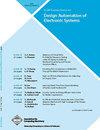Task modules Partitioning, Scheduling and Floorplanning for Partially Dynamically Reconfigurable Systems with Heterogeneous Resources
IF 2.2
4区 计算机科学
Q3 COMPUTER SCIENCE, HARDWARE & ARCHITECTURE
ACM Transactions on Design Automation of Electronic Systems
Pub Date : 2023-09-26
DOI:10.1145/3625295
引用次数: 0
Abstract
Some field programmable gate arrays (FPGAs) can be partially dynamically reconfigurable with heterogeneous resources distributed on the chip. FPGA-based partially dynamically reconfigurable system (FPGA-PDRS) can be used to accelerate computing and improve computing flexibility. However, the traditional design of FPGA-PDRS is based on manual design. Implementing the automation of FPGA-PDRS needs to solve the problems of task modules partitioning, scheduling, and floorplanning on heterogeneous resources. Existing works only partly solve problems for the automation process of FPGA-PDRS or model homogeneous resource for FPGA-PDRS. To better solve the problems in the automation process of FPGA-PDRS and narrow the gap between algorithm and application, in this paper, we propose a complete workflow including three parts: pre-processing to generate the lists of task module candidate shapes according to the resource requirements, exploration process to search the solution of task modules partitioning, scheduling, and floorplanning, and post-optimization to improve the floorplan success rate. Experimental results show that, compared with state-of-the-art work, the pre-processing process can reduce the occupied area of task modules by 6% on average; the proposed complete workflow can improve performance by 9.6%, and reduce communication cost by 14.2% with improving the resources reuse rate of the heterogeneous resources on the chip. Based on the solution generated by the exploration process, the post-optimization process can improve the floorplan success rate by 11%.具有异构资源的部分动态可重构系统的任务模块划分、调度和楼层规划
一些现场可编程门阵列(fpga)可以部分动态重构分布在芯片上的异构资源。基于fpga的部分动态可重构系统(partial dynamic reconfigurable system, FPGA-PDRS)可以提高计算速度和计算灵活性。然而,传统的FPGA-PDRS设计是基于手工设计的。实现FPGA-PDRS的自动化需要解决任务模块在异构资源上的划分、调度和布局问题。现有的工作只是部分解决了FPGA-PDRS自动化过程或FPGA-PDRS模型资源同构的问题。为了更好地解决FPGA-PDRS自动化过程中存在的问题,缩小算法与应用之间的差距,本文提出了一个完整的工作流程,包括三个部分:预处理,根据资源需求生成任务模块候选形状列表;探索,搜索任务模块划分、调度和布局的解决方案;后期优化,提高布局成功率。实验结果表明,与现有工作相比,该预处理过程可使任务模块占用面积平均减少6%;提出的完整工作流提高了芯片上异构资源的资源重用率,性能提高了9.6%,通信成本降低了14.2%。基于勘探过程生成的解,后优化过程可将平面图成功率提高11%。
本文章由计算机程序翻译,如有差异,请以英文原文为准。
求助全文
约1分钟内获得全文
求助全文
来源期刊
CiteScore
3.20
自引率
7.10%
发文量
105
审稿时长
3 months
期刊介绍:
TODAES is a premier ACM journal in design and automation of electronic systems. It publishes innovative work documenting significant research and development advances on the specification, design, analysis, simulation, testing, and evaluation of electronic systems, emphasizing a computer science/engineering orientation. Both theoretical analysis and practical solutions are welcome.

 求助内容:
求助内容: 应助结果提醒方式:
应助结果提醒方式:


